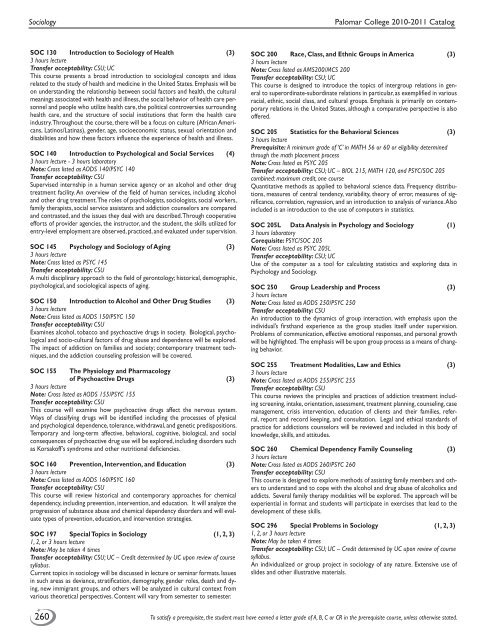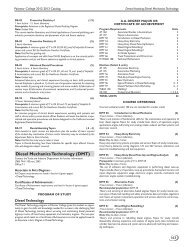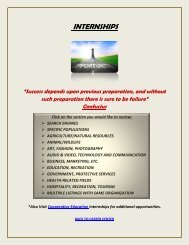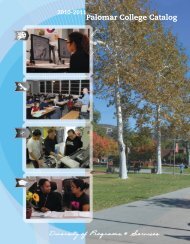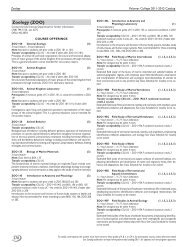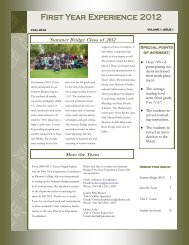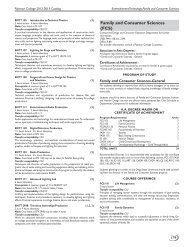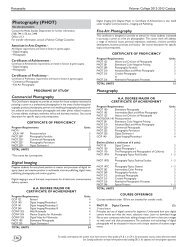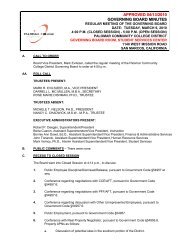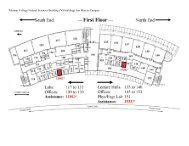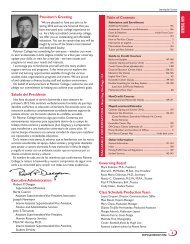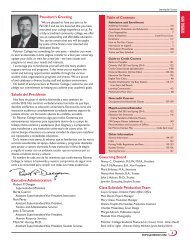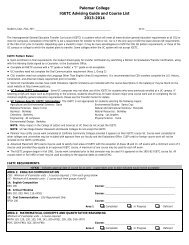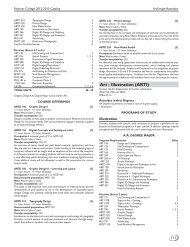Download the complete catalog - Palomar College
Download the complete catalog - Palomar College
Download the complete catalog - Palomar College
You also want an ePaper? Increase the reach of your titles
YUMPU automatically turns print PDFs into web optimized ePapers that Google loves.
Sociology<br />
<strong>Palomar</strong> <strong>College</strong> 2010-2011 Catalog<br />
SOC 130 Introduction to Sociology of Health (3)<br />
3 hours lecture<br />
Transfer acceptability: CSU; UC<br />
This course presents a broad introduction to sociological concepts and ideas<br />
related to <strong>the</strong> study of health and medicine in <strong>the</strong> United States. Emphasis will be<br />
on understanding <strong>the</strong> relationship between social factors and health, <strong>the</strong> cultural<br />
meanings associated with health and illness, <strong>the</strong> social behavior of health care personnel<br />
and people who utilize health care, <strong>the</strong> political controversies surrounding<br />
health care, and <strong>the</strong> structure of social institutions that form <strong>the</strong> health care<br />
industry. Throughout <strong>the</strong> course, <strong>the</strong>re will be a focus on culture (African Americans,<br />
Latinos/Latinas), gender, age, socioeconomic status, sexual orientation and<br />
disabilities and how <strong>the</strong>se factors influence <strong>the</strong> experience of health and illness.<br />
SOC 140 Introduction to Psychological and Social Services (4)<br />
3 hours lecture - 3 hours laboratory<br />
Note: Cross listed as AODS 140/PSYC 140<br />
Transfer acceptability: CSU<br />
Supervised internship in a human service agency or an alcohol and o<strong>the</strong>r drug<br />
treatment facility. An overview of <strong>the</strong> field of human services, including alcohol<br />
and o<strong>the</strong>r drug treatment. The roles of psychologists, sociologists, social workers,<br />
family <strong>the</strong>rapists, social service assistants and addiction counselors are compared<br />
and contrasted, and <strong>the</strong> issues <strong>the</strong>y deal with are described. Through cooperative<br />
efforts of provider agencies, <strong>the</strong> instructor, and <strong>the</strong> student, <strong>the</strong> skills utilized for<br />
entry-level employment are observed, practiced, and evaluated under supervision.<br />
SOC 145 Psychology and Sociology of Aging (3)<br />
3 hours lecture<br />
Note: Cross listed as PSYC 145<br />
Transfer acceptability: CSU<br />
A multi disciplinary approach to <strong>the</strong> field of gerontology; historical, demographic,<br />
psychological, and sociological aspects of aging.<br />
SOC 150 Introduction to Alcohol and O<strong>the</strong>r Drug Studies (3)<br />
3 hours lecture<br />
Note: Cross listed as AODS 150/PSYC 150<br />
Transfer acceptability: CSU<br />
Examines alcohol, tobacco and psychoactive drugs in society. Biological, psychological<br />
and socio-cultural factors of drug abuse and dependence will be explored.<br />
The impact of addiction on families and society; contemporary treatment techniques,<br />
and <strong>the</strong> addiction counseling profession will be covered.<br />
SOC 155 The Physiology and Pharmacology<br />
of Psychoactive Drugs (3)<br />
3 hours lecture<br />
Note: Cross listed as AODS 155/PSYC 155<br />
Transfer acceptability: CSU<br />
This course will examine how psychoactive drugs affect <strong>the</strong> nervous system.<br />
Ways of classifying drugs will be identified including <strong>the</strong> processes of physical<br />
and psychological dependence, tolerance, withdrawal, and genetic predispositions.<br />
Temporary and long-term affective, behavioral, cognitive, biological, and social<br />
consequences of psychoactive drug use will be explored, including disorders such<br />
as Korsakoff’s syndrome and o<strong>the</strong>r nutritional deficiencies.<br />
SOC 160 Prevention, Intervention, and Education (3)<br />
3 hours lecture<br />
Note: Cross listed as AODS 160/PSYC 160<br />
Transfer acceptability: CSU<br />
This course will review historical and contemporary approaches for chemical<br />
dependency, including prevention, intervention, and education. It will analyze <strong>the</strong><br />
progression of substance abuse and chemical dependency disorders and will evaluate<br />
types of prevention, education, and intervention strategies.<br />
SOC 197 Special Topics in Sociology (1, 2, 3)<br />
1, 2, or 3 hours lecture<br />
Note: May be taken 4 times<br />
Transfer acceptability: CSU; UC – Credit determined by UC upon review of course<br />
syllabus.<br />
Current topics in sociology will be discussed in lecture or seminar formats. Issues<br />
in such areas as deviance, stratification, demography, gender roles, death and dying,<br />
new immigrant groups, and o<strong>the</strong>rs will be analyzed in cultural context from<br />
various <strong>the</strong>oretical perspectives. Content will vary from semester to semester.<br />
SOC 200 Race, Class, and Ethnic Groups in America (3)<br />
3 hours lecture<br />
Note: Cross listed as AMS200/MCS 200<br />
Transfer acceptability: CSU; UC<br />
This course is designed to introduce <strong>the</strong> topics of intergroup relations in general<br />
to superordinate-subordinate relations in particular, as exemplified in various<br />
racial, ethnic, social class, and cultural groups. Emphasis is primarily on contemporary<br />
relations in <strong>the</strong> United States, although a comparative perspective is also<br />
offered.<br />
SOC 205 Statistics for <strong>the</strong> Behavioral Sciences (3)<br />
3 hours lecture<br />
Prerequisite: A minimum grade of ‘C’ in MATH 56 or 60 or eligibility determined<br />
through <strong>the</strong> math placement process<br />
Note: Cross listed as PSYC 205<br />
Transfer acceptability: CSU; UC – BIOL 215, MATH 120, and PSYC/SOC 205<br />
combined: maximum credit, one course<br />
Quantitative methods as applied to behavioral science data. Frequency distributions,<br />
measures of central tendency, variability, <strong>the</strong>ory of error, measures of significance,<br />
correlation, regression, and an introduction to analysis of variance. Also<br />
included is an introduction to <strong>the</strong> use of computers in statistics.<br />
SOC 205L Data Analysis in Psychology and Sociology (1)<br />
3 hours laboratory<br />
Corequisite: PSYC/SOC 205<br />
Note: Cross listed as PSYC 205L<br />
Transfer acceptability: CSU; UC<br />
Use of <strong>the</strong> computer as a tool for calculating statistics and exploring data in<br />
Psychology and Sociology.<br />
SOC 250 Group Leadership and Process (3)<br />
3 hours lecture<br />
Note: Cross listed as AODS 250/PSYC 250<br />
Transfer acceptability: CSU<br />
An introduction to <strong>the</strong> dynamics of group interaction, with emphasis upon <strong>the</strong><br />
individual’s firsthand experience as <strong>the</strong> group studies itself under supervision.<br />
Problems of communication, effective emotional responses, and personal growth<br />
will be highlighted. The emphasis will be upon group process as a means of changing<br />
behavior.<br />
SOC 255 Treatment Modalities, Law and Ethics (3)<br />
3 hours lecture<br />
Note: Cross listed as AODS 255/PSYC 255<br />
Transfer acceptability: CSU<br />
This course reviews <strong>the</strong> principles and practices of addiction treatment including<br />
screening, intake, orientation, assessment, treatment planning, counseling, case<br />
management, crisis intervention, education of clients and <strong>the</strong>ir families, referral,<br />
report and record keeping, and consultation. Legal and ethical standards of<br />
practice for addictions counselors will be reviewed and included in this body of<br />
knowledge, skills, and attitudes.<br />
SOC 260 Chemical Dependency Family Counseling (3)<br />
3 hours lecture<br />
Note: Cross listed as AODS 260/PSYC 260<br />
Transfer acceptability: CSU<br />
This course is designed to explore methods of assisting family members and o<strong>the</strong>rs<br />
to understand and to cope with <strong>the</strong> alcohol and drug abuse of alcoholics and<br />
addicts. Several family <strong>the</strong>rapy modalities will be explored. The approach will be<br />
experiential in format and students will participate in exercises that lead to <strong>the</strong><br />
development of <strong>the</strong>se skills.<br />
SOC 296 Special Problems in Sociology (1, 2, 3)<br />
1, 2, or 3 hours lecture<br />
Note: May be taken 4 times<br />
Transfer acceptability: CSU; UC – Credit determined by UC upon review of course<br />
syllabus.<br />
An individualized or group project in sociology of any nature. Extensive use of<br />
slides and o<strong>the</strong>r illustrative materials.<br />
260 To satisfy a prerequisite, <strong>the</strong> student must have earned a letter grade of A, B, C or CR in <strong>the</strong> prerequisite course, unless o<strong>the</strong>rwise stated.


